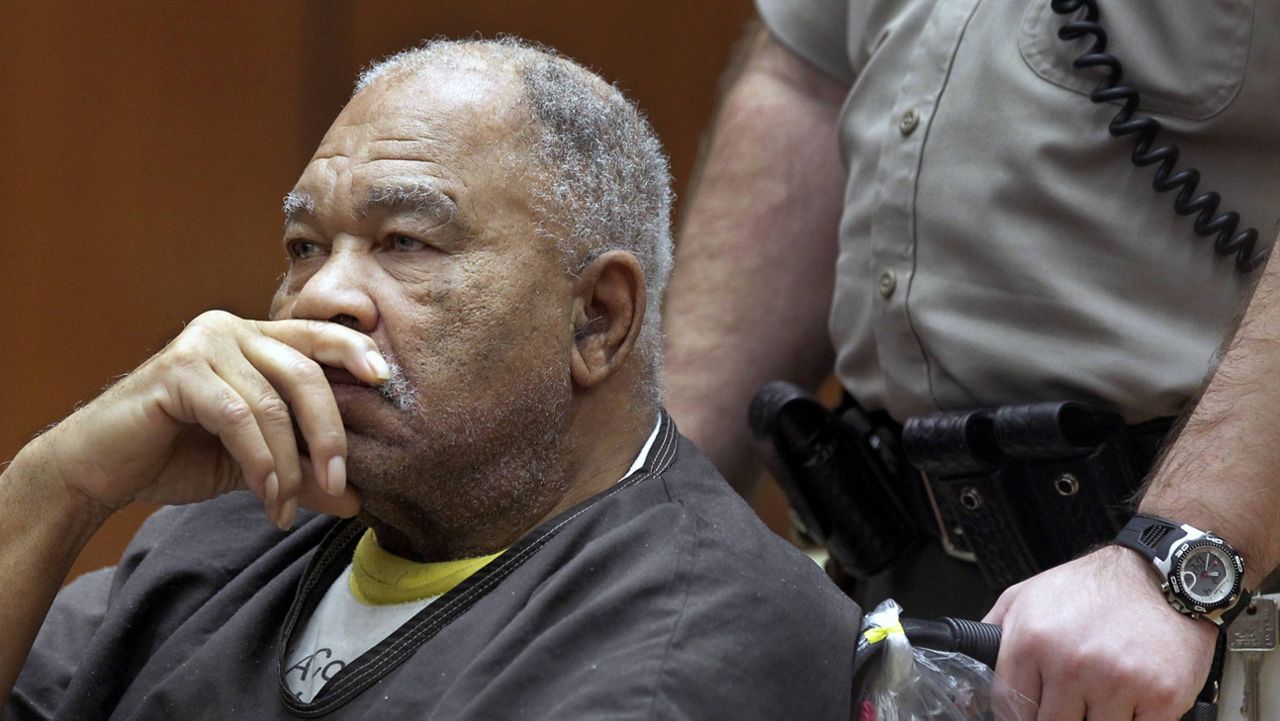LOS ANGELES (CNS) — A man who was described by a prosecutor as a "remorseless, vicious serial killer" for murdering three women in Los Angeles in the 1980s and was subsequently confirmed by the FBI to be the most prolific serial killer in U.S. history died Wednesday at age 80, state prison officials announced.
What You Need To Know
- Samuel Little had been serving three consecutive life prison terms without the possibility of parole at the California State Prison in Lancaster
- He was pronounced dead at an outside hospital
- Little went on to confess to 93 murders after being convicted of the three Los Angeles killings
- Law enforcement was able to verify 50 of the confessions, with "many more pending final confirmation"
Samuel Little — who had been serving three consecutive life prison terms without the possibility of parole at the California State Prison in Lancaster — was pronounced dead at an outside hospital, according to the California Department of Corrections and Rehabilitation.
The cause of his death will be determined by the Los Angeles County Coroner's Office, authorities said.
Little went on to confess to 93 murders after being convicted of the three Los Angeles killings, according to the FBI. Law enforcement was able to verify 50 of the confessions, with "many more pending final confirmation," the FBI reported in October 2019.
"For many years, Samuel Little believed he would not be caught because he thought no one was accounting for his victims," Christi Palazzolo, a crime analyst with the FBI's Violent Criminal Apprehension Program, said in the FBI's statement then. "Even though he is already in prison, the FBI believes it is important to seek justice for each victim — to close every case possible."
The FBI had asked for the public's help in matching the remaining "unconfirmed confessions," noting that the videotaped confessions about killings in Florida, Arkansas, Kentucky, Nevada, and Louisiana between 1971 and 1994 contained "references to violent acts." Each of the videos was accompanied by Little's drawing of the victim, according to the FBI.
Little was convicted in Los Angeles in September 2014 of the slayings of Carol Alford, 41, who was found dead on July 13, 1987, in an alley off East 27th Street; Audrey Nelson, 35, who was discovered dead on Aug. 14, 1989, in a trash bin behind East Seventh Street, and Guadalupe Apodaca, 46, who was found dead less than a month later — Sept. 3, 1989 — inside a South Los Angeles commercial garage.
In court papers filed shortly before Little was sentenced, Deputy District Attorney Beth Silverman described him as a "remorseless, vicious serial killer." She told reporters he "absolutely" would have faced a potential death sentence had it not been for his age — 74 at the time.
In a sentencing memorandum, the prosecutor wrote that the evidence "established that he derived sexual gratification from the act of strangling and murdering his victims." She said Little's "method of killing was particularly ruthless; he lured vulnerable women to him with the promise of drugs and then killed them by beating and manually strangling them."
Little — who had lived in the South Los Angeles area in the late 1980s and said he was a middleweight prize boxer — was arrested in Louisville, Kentucky, in 2012 on an unrelated drug charge out of Los Angeles and extradited to California, where he was charged with the murders.
Little's attorney questioned the evidence and challenged the prosecutor's insistence that DNA proved his client's guilt.
"I didn't do it!" Little interrupted after Mary Louise Frias, the niece and goddaughter of one of the victims, told the judge at Little's September 2014 sentencing that the convicted killer has "no conscience, no soul."
Little denied his guilt during trial, which included testimony from women who said they narrowly survived violent encounters with him.
A three-justice panel from California's 2nd District Court of Appeal subsequently turned down the defense's claims that there was insufficient evidence to prove that Little was the person who committed the murders and that the trial court erred by allowing jurors to hear evidence about similar attacks in the 1980s against four other women who survived. In May 2017, the California Supreme Court refused to review his case.
Two investigators accompanied a ranger to California to interview Little in the spring of 2018 and in exchange for helping him change prisons, Little agreed to provide information.
He went through cities and states and told investigators the number of victims he had killed in each locale, even providing the sketches he drew of the victims.
Authorities said he selected "marginalized and vulnerable women who were often involved in prostitution and addicted to drugs."
"Their bodies sometimes went unidentified and their deaths un-investigated," according to the FBI. "In the early 1980s, Little had also been charged with killing women in Mississippi and Florida but escaped indictment in Mississippi and conviction in Florida. He had, however, served time for assaulting a woman in Missouri and for the assault and false imprisonment of a woman in San Diego. When Los Angeles got the DNA hit on Little, they asked the FBI's Violent Criminal Apprehension Program to work up a full background on him. The FBI found an alarming pattern and compelling links to many more murders."



